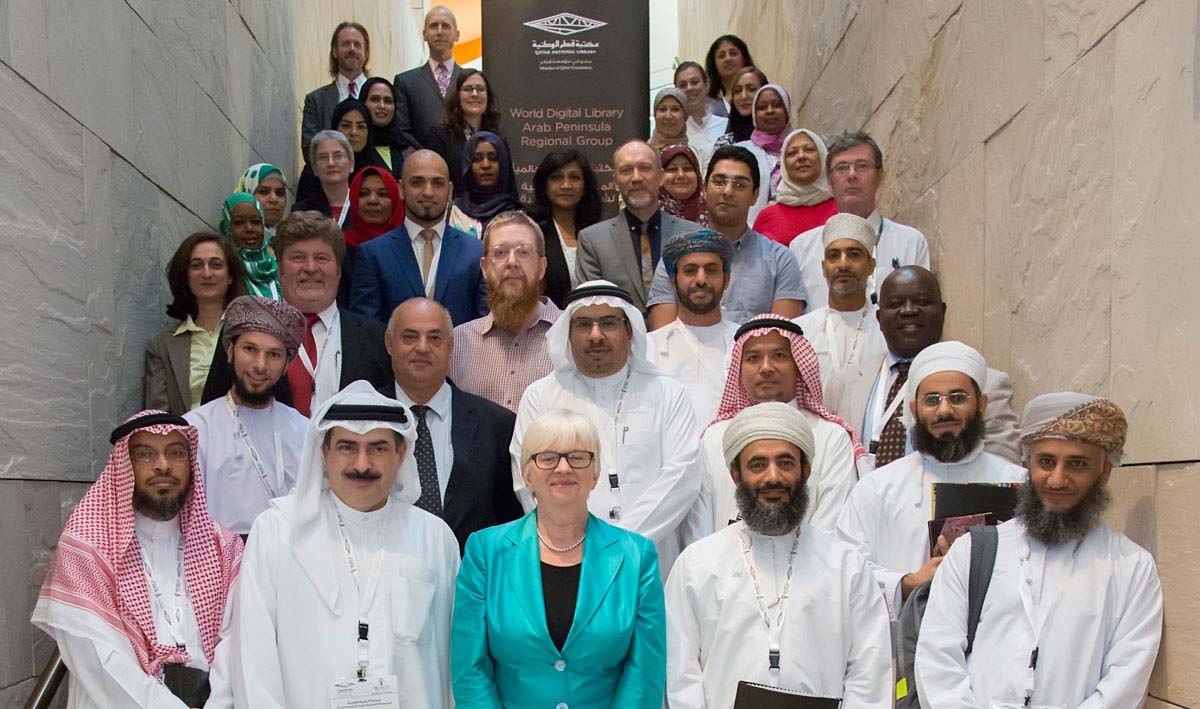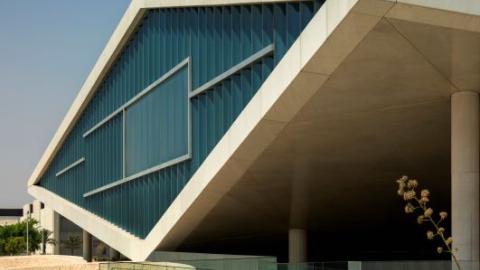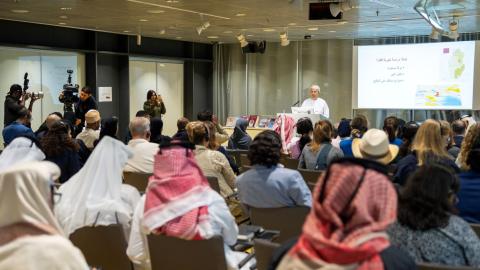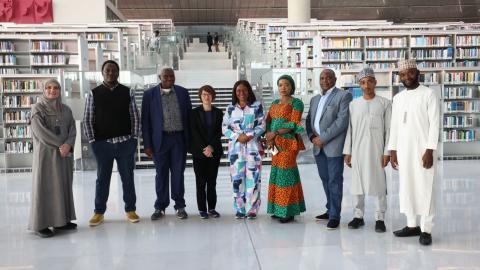
Doha, Qatar: Participants in the World Digital Library (WDL) Arab Peninsula Regional Group Symposium 2015 commended the efforts Qatar National Library (QNL), a member of Qatar Foundation for Education, Science and Community Development, is making to bring regional libraries together to work on heritage preservation and sharing.
The WDL Arab Peninsula Regional Group Symposium 2015 was organised by QNL in collaboration with the WDL. The two-day symposium, which builds on the great success of the training workshops in 2013 and 2014, this year focused on Arab Authority Control - how library catalogue and bibliographic information can be organised in Arabic. The symposium took place at the Hamad Bin Khalifa University Student Centre within Qatar Foundation’s Education City, and attracted more than 40 attendees.
By sharing valuable information and cultivating creativity within the regional community at the symposium, QNL continues to support Qatar Foundation in its mission to foster a progressive society, while preserving and protecting the nation’s heritage for future generations.
Delegates included senior representatives, professors and librarians from a number of libraries, heritage centres and universities including Qatar, Oman, Kuwait, Iraq, Jordan, Saudi Arabia, Sudan, Bahrain, Yemen and the USA. The symposium provided the participants with information, tools and resources that can be used for cataloguing in their respective libraries, as well as to develop a common understanding of the concepts and tools among the contributors to the WDL so that the records they contribute are better and useful for all.
Speaking about the symposium, Eng. Saadi Al Said, QNL’s Associate Director for Administration and Planning, said: “QNL is proud to once again collaborate with the WDL to organise a highly informative symposium on the preservation of our heritage. Such symposiums and meetings provide the opportunity for sharing the best practices in the area of heritage preservation and sharing, and will benefit not just QNL but other libraries and information centres throughout the region.”
Commenting about the symposium, Mr Jason Yasner, Operations Manager at the WDL, the Library of Congress, said: “The symposium on the Arabic Authority Control this year is very timely because this is a big and wide topic that faces libraries and a serious challenge that stands in the way of sharing heritage material among the different libraries and with the WDL.”
“The collaboration between QNL and the WDL should be seen as a model throughout the world. I would like to see other regions replicate this, with regional partners working together to tackle issues and topics that are important and relevant to them,” he added.
Speaking on the content of the symposium and the cooperation between the libraries in the region, Mr Saleh bin Suleiman Al Zuhimi of ‘Thakirat Oman’ (The Memory of Oman), said: “This is the third time I have participated in this annual symposium organised by QNL and it is clear that each year, the topics chosen for discussion are important and relevant to our work in libraries and information centres.”
Commenting on the importance and relevance of the symposium to the libraries in the region, Dr Ali bin Saad Al Ali of the Saudi Digital History Centre of King Abdulaziz Foundation for Research and Archives, said: “We would like to thank Qatar National Library for teaming up with the WDL to organise this useful symposium, which raised a very crucial topic for all of us - ‘Arabic Authority Control’. The topics and issues we discussed during this symposium are extremely relevant and important to our libraries and information centres and should contribute to a better cooperation between Arab libraries.”
WDL was created by the Library of Congress, and reinforced by the United Nations Educational, Scientific and Cultural Organisation (UNESCO) and the International Federation of Library Associations and Institutions (IFLA). Libraries and cultural institutions from around the world contribute to WDL, led by the Library of Congress, by sharing their cultural treasures to create a digital fountain of knowledge. Information contained within WDL is available in seven languages, including Arabic.
The WDL Arab Peninsula Regional Group Symposium 2015 was organised by QNL in collaboration with the WDL. The two-day symposium, which builds on the great success of the training workshops in 2013 and 2014, this year focused on Arab Authority Control - how library catalogue and bibliographic information can be organised in Arabic. The symposium took place at the Hamad Bin Khalifa University Student Centre within Qatar Foundation’s Education City, and attracted more than 40 attendees.
By sharing valuable information and cultivating creativity within the regional community at the symposium, QNL continues to support Qatar Foundation in its mission to foster a progressive society, while preserving and protecting the nation’s heritage for future generations.
Delegates included senior representatives, professors and librarians from a number of libraries, heritage centres and universities including Qatar, Oman, Kuwait, Iraq, Jordan, Saudi Arabia, Sudan, Bahrain, Yemen and the USA. The symposium provided the participants with information, tools and resources that can be used for cataloguing in their respective libraries, as well as to develop a common understanding of the concepts and tools among the contributors to the WDL so that the records they contribute are better and useful for all.
Speaking about the symposium, Eng. Saadi Al Said, QNL’s Associate Director for Administration and Planning, said: “QNL is proud to once again collaborate with the WDL to organise a highly informative symposium on the preservation of our heritage. Such symposiums and meetings provide the opportunity for sharing the best practices in the area of heritage preservation and sharing, and will benefit not just QNL but other libraries and information centres throughout the region.”
Commenting about the symposium, Mr Jason Yasner, Operations Manager at the WDL, the Library of Congress, said: “The symposium on the Arabic Authority Control this year is very timely because this is a big and wide topic that faces libraries and a serious challenge that stands in the way of sharing heritage material among the different libraries and with the WDL.”
“The collaboration between QNL and the WDL should be seen as a model throughout the world. I would like to see other regions replicate this, with regional partners working together to tackle issues and topics that are important and relevant to them,” he added.
Speaking on the content of the symposium and the cooperation between the libraries in the region, Mr Saleh bin Suleiman Al Zuhimi of ‘Thakirat Oman’ (The Memory of Oman), said: “This is the third time I have participated in this annual symposium organised by QNL and it is clear that each year, the topics chosen for discussion are important and relevant to our work in libraries and information centres.”
Commenting on the importance and relevance of the symposium to the libraries in the region, Dr Ali bin Saad Al Ali of the Saudi Digital History Centre of King Abdulaziz Foundation for Research and Archives, said: “We would like to thank Qatar National Library for teaming up with the WDL to organise this useful symposium, which raised a very crucial topic for all of us - ‘Arabic Authority Control’. The topics and issues we discussed during this symposium are extremely relevant and important to our libraries and information centres and should contribute to a better cooperation between Arab libraries.”
WDL was created by the Library of Congress, and reinforced by the United Nations Educational, Scientific and Cultural Organisation (UNESCO) and the International Federation of Library Associations and Institutions (IFLA). Libraries and cultural institutions from around the world contribute to WDL, led by the Library of Congress, by sharing their cultural treasures to create a digital fountain of knowledge. Information contained within WDL is available in seven languages, including Arabic.



